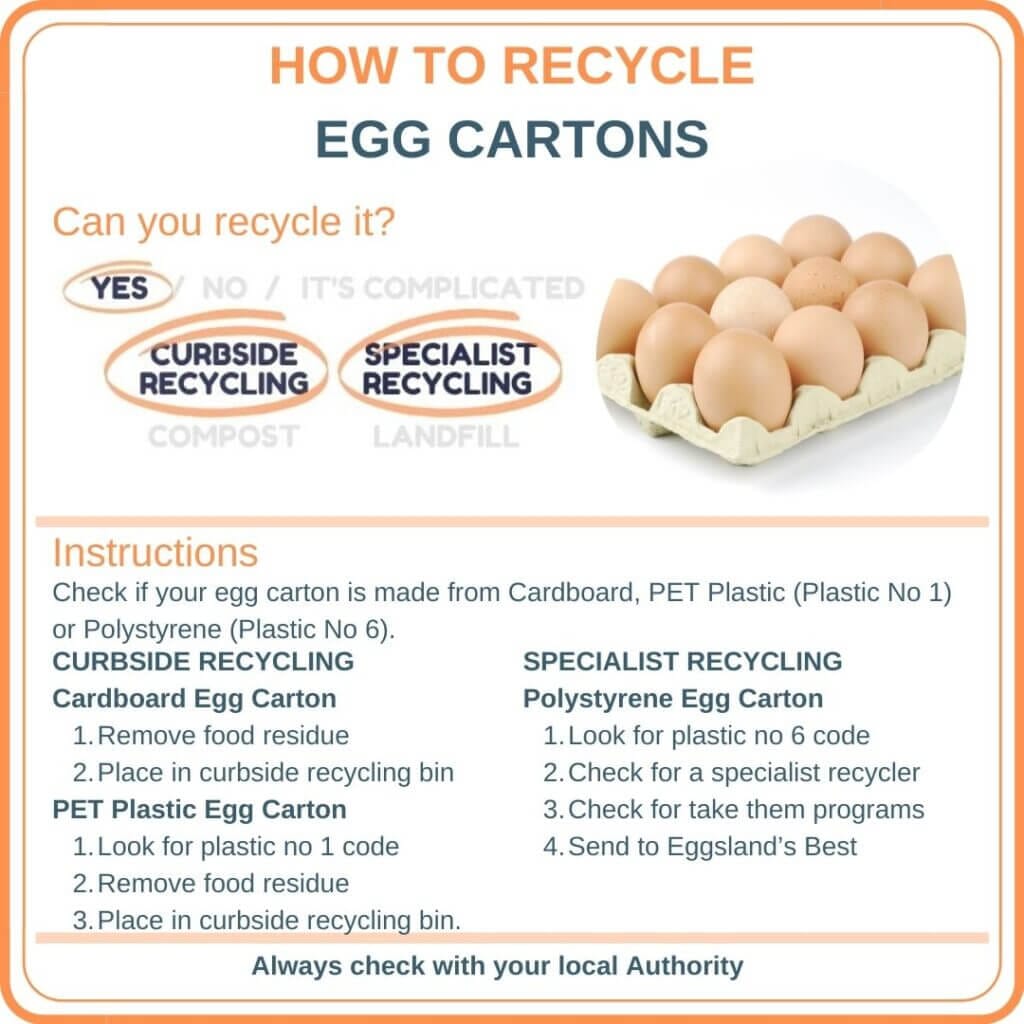Okay, so you’re diligent about recycling common household items. But what about those egg cartons? Do they belong in the recycling bin or the trash? The answer is more nuanced than you might think. This guide provides comprehensive information about recycling different types of egg cartons (styrofoam, cardboard, plastic), addresses regional variations in recycling programs, and explores related topics like composting and creative reuse.
Decoding Egg Carton Recyclability
The fate of your egg carton hinges on its composition. Different materials have different recycling journeys. Let’s break down the carton conundrum.
What’s It Made Of?
The recyclability of your egg carton largely depends on its material. Different materials have different recycling properties, and understanding these nuances can make all the difference. [https://www.lolaapp.com/a-gallon-of-gasoline-weighs]
Paper Pulp and Cardboard Cartons
The good news is that most paper pulp or cardboard egg cartons are recyclable. These eco-friendly containers often originate from recycled materials, creating a closed-loop system. Even if your local recycling program doesn’t accept them (which is uncommon), they’re usually compostable, returning nutrients to the soil.
Plastic Cartons: The #1 Question
Plastic egg cartons, typically made from #1 plastic (PET or PS), present a more complex scenario. While technically recyclable, actual recycling depends heavily on your local facilities. Some programs readily accept #1 PET plastic egg cartons, while others don’t. Check with your local waste management authority for clarification. Cleanliness is key; food residue can contaminate the entire recycling stream. [https://www.lolaapp.com/ambergris-whale-perfume]
Styrofoam Cartons: A Recycling Challenge
Styrofoam egg cartons, made from polystyrene (#6 plastic), are the most problematic for recycling. This plastic is difficult and costly to recycle due to its low density and absorbency. Consequently, it often ends up in landfills. Consider repurposing before discarding.
Beyond the Bin: Repurposing and Composting
Before you even think about recycling, consider giving those egg cartons a second life. They make excellent seed starters, kids’ craft project materials, or organizers for small items. Repurposing reduces waste and sparks creativity.
If your local program doesn’t accept cardboard cartons, composting is an excellent alternative. Cardboard decomposes readily, enriching your garden soil with nutrients.
Recycling Egg Cartons: A Step-by-Step Guide
- Identify the Material: Is it paper, plastic, or styrofoam? This determines its fate.
- Clean It: Remove any food residue. A quick rinse and dry will suffice.
- Check Local Guidelines: Recycling rules vary; know your local program’s specifics.
- Decode the Symbols: Look for the chasing arrows recycling symbol. The number inside indicates the plastic type. #1 (PET) and #2 (HDPE) are generally accepted, but always confirm with local guidelines.
Environmental Impact and Future Innovations
Choosing an egg carton material has environmental consequences. Paper cartons are often made from recycled content and are recyclable, but their production still requires resources. Plastic cartons offer durability and are potentially recyclable but can persist in the environment if not disposed of properly. Styrofoam presents significant recycling challenges and contributes to landfill waste. Being aware of these impacts allows for informed consumer choices.
The search for truly sustainable egg packaging continues. Innovations like mushroom-based materials or compostable bioplastics offer a promising, eco-friendly future. The future of your morning eggs might be greener than you think.
Why Are Cardboard Egg Cartons Sometimes Not Recyclable?
You might be surprised to learn that even cardboard egg cartons aren’t always recyclable. While made of paper, contamination and short fibers often make them unsuitable for many recycling programs. Food residue and wax coatings can contaminate them, making them unrecyclable even if your local program does accept them.
The Egg Carton Material Matrix
Different egg carton materials have varying recycling profiles:
- Styrofoam: This material is rarely recyclable due to its low density and complex composition.
- Plastic: Clear plastic cartons might be acceptable in some programs, but this varies widely.
- Cardboard: The most common type is theoretically recyclable. However, contamination can be a significant issue.
The Contamination Conundrum
Food residue disrupts the recycling stream. Even a small amount of egg can contaminate a whole batch of recycled material. Some cartons are also coated with wax, further complicating the recycling process.
Navigating Local Recycling Rules
Recycling regulations vary significantly by region. Your local facility has its own set of rules. Some are more lenient, accepting a wider range of materials, while others are stricter. Checking your local facility’s website or contacting them directly is the best way to determine your egg carton’s fate.
Beyond Recycling: Repurposing and Composting
If recycling isn’t an option, consider repurposing. Use them as seed starters, craft supplies, or small storage containers. Composting is another excellent alternative for cardboard cartons.
Are Egg Cartons Recyclable in the UK?
In the UK, the recyclability of egg cartons follows a similar pattern:
Cracking the UK Recycling Code
- Cardboard Cartons: Generally accepted in most UK kerbside recycling programs. Check with your local council for specific guidelines. Clean, dry cartons are preferred. Composting is a great alternative.
- Plastic Cartons: Recycling depends entirely on local council policies. Consult your local council’s website. Consider repurposing if recycling isn’t an option.
- Polystyrene Cartons: Rarely recyclable in the UK due to the complex and expensive recycling process. Reuse is the best approach.
Composting and Creative Reuse
Composting is an excellent alternative for cardboard cartons if your council doesn’t accept them for recycling. Tear them into smaller pieces and add them to your compost bin.
Recycling is great, but reusing is even better. Before discarding an egg carton, consider giving it a second life as seed starters, paint palettes, or organizers.
What Do You Do With Empty Egg Cartons?
So, you’re left with a stack of empty egg cartons. What now?
Determining Egg Carton Destiny
The material dictates the egg carton’s future. Cardboard cartons are generally recyclable and compostable. Plastic cartons’ recyclability depends on local guidelines. PET (polyethylene terephthalate) is more likely to be recycled than PS (polystyrene). Styrofoam cartons are rarely recyclable.
Recycling and Repurposing
Paper/cardboard cartons are generally recyclable curbside. Clean them and flatten them to save space. Plastic cartons require checking local guidelines. Styrofoam is rarely accepted in curbside programs due to its low density.
Repurposing offers many possibilities: Use them as seed starters, organizers, craft materials, or even for soundproofing. Cardboard cartons can also be used in the garden as weed suppressants or mulch.
| Egg Carton Material | Recyclability | Composting | Repurposing Ideas |
|---|---|---|---|
| Paper/Cardboard | Generally curbside recyclable | Yes | Seed starters, crafts, storage, fire starters |
| Plastic (PET/PS) | Depends on local guidelines; PET more likely than PS | No | Limited repurposing; check local regulations |
| Styrofoam | Rarely recyclable | No | Packing material, limited crafting |
Always check with your local recycling provider for the most up-to-date information. Even small actions can make a big difference in reducing waste and promoting a more sustainable future.
- Unlock Elemental 2 Secrets: Actionable Insights Now - April 2, 2025
- Lot’s Wife’s Name: Unveiling the Mystery of Sodom’s Fall - April 2, 2025
- Photocell Sensors: A Complete Guide for Selection and Implementation - April 2, 2025

















1 thought on “Can You Recycle Egg Cartons? A Complete Guide”
Comments are closed.